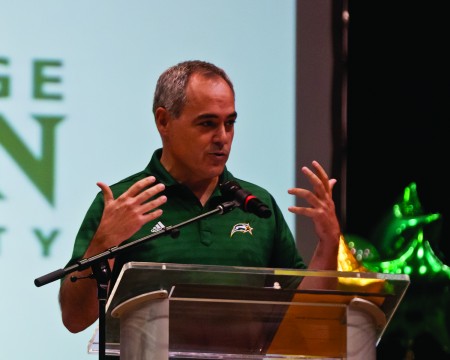Angel Cabrera paced through a small town in western Spain.
He was a small boy and didn’t care that the town was impoverished and faltering in many ways. As he walked through the streets, people stopped him to ask who he was related to in the town.
Cabrera spent many summers in the town, talking to people about his grandfather, and always received stories of great admiration for one of the men who had a great impact on his life.
“Listening to all these people talk about the admiration they had for my grandfather, I always thought there was no better job than being a teacher,” Cabrera said. “I always thought that being a teacher was the most magical thing anyone could do.”
After years of schooling, Cabrera, a holder of four degrees, became the dean of the IE Business School in Madrid, ranked one of the top business schools in the world, and was later named the president of Thunderbird School of Global Management in Arizona.
“I wanted to be in education early one,” Cabrera said. “From there to becoming a university president is a series of accidents.”
Named the sixth president of the university and taking office in July, Cabrera has the benefit of following two of the longest tenured leaders in Mason’s short history: Dr. George W. Johnson and Dr. Alan Merten.
“I follow two great presidents,” Cabrera said. “I’m honored to somehow have my name next to theirs.”
Cabrera has spent a significant amount of time speaking with Dr. Johnson and Dr. Merten, working to create a vision for his presidency at Mason. Though he will not reveal his vision for the university until next fall, Cabrera was clear in saying that his vision is not simply his thoughts or his ideas. His vision is a compilation of ideas from people throughout the community, from politicians to members of the student body.
“I will help clarify [a vision],” Cabrera said. “And, once it is clear, I will own it. I will be the flag bearer. I will lead the charge. But this is not about what Dr. Cabrera thinks this university should be; it’s about what we, as a community, want this university to become.”
Perhaps his most important tool for connecting with Mason students, Cabrera uses Twitter to hear the voices of students, faculty, staff and alumni. Twitter, he says, has changed the way he operates as a person and as a leader. He uses it as a valuable tool to connect with people on a more personal level.
“One of the risks that a leader has in any organization is to be separated from the people they are serving,” Cabrera said. “If you don’t understand the people who you are serving, how can you serve them? It is a real risk. If you are not careful, you might be disconnected.”
Twitter, he says, helps him avoid that trap and will help him diagram a vision that includes input from a variety of people throughout the community.
One of the most attractive opportunities about Mason, Cabrera says, is its commitment to innovation and its commitment to continued improvement.
“We have been ranked as one of the top up-and-coming universities in the nation,” Cabrera says. “And I hope we can always keep that because it means that we are always asking, ‘How can we do our work better?’”
Cabrera brings a background that closely reflects the diversity and uniqueness of the student body. Because his journey is not traditional, as he was born in Spain before immigrating to the United States and becoming a proud American citizen, Cabrera was immediately intrigued by the incredible diversity at the university and believes that his international background may have landed him the job back in December.
His love and curiosity regarding new cultures and new people leads him to believe that diversity is one of the richest forms of education. In diversity, he sees an opportunity to learn and to see the world through different pairs of eyes.
“Mason, in many ways, represents a new form of university,” Cabrera said. “As someone who is coming from the outside, this is what a modern metropolitan university should be like in the 21st century. And that’s what excites me. Now, we just need to figure out a way to take it a step further.”
Unlike many traditional universities, Cabrera admires Mason’s commitment to diversity. He says it is easy for “universities to become stuck or trapped” by a traditional way of understanding themselves. But, in Mason, Cabrera sees a seemingly mirror-image of himself: young, unique and innovative.







Comments